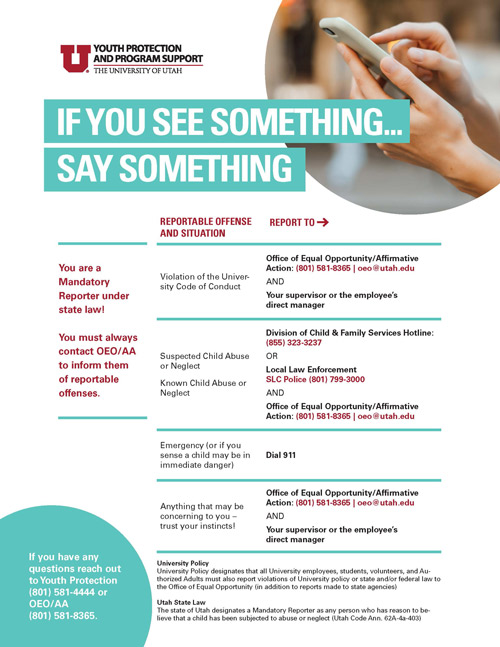Youth Protection - Reporting Information
“If you see something...say something”
If a situation makes you or a child uncomfortable, pick up the phone or talk to a supervisor. It’s a legal duty, and it’s the right thing to do!
YOU ARE A MANDATORY REPORTER UNDER STATE LAW. YOU MUST ALWAYS CONTACT OEO/AA TO REPORT ANY OF THE FOLLOWING:
- Any Violation Of the University Code Of Conduct
- The Code of Conduct applies to all adults interacting with the minors participating in an event or program. If you see something that is an obvious or suspected violation of the Code of Conduct, you are required to report it to the appropriate authority.
- Report to: Office of Equal Opportunity/Affirmative Action: (801) 581-8365 | oeo@utah.edu AND Your supervisor or the employee’s direct manager
- If You Know Or Suspect That A Minor Is Suffering Abuse Or Neglect
- Regardless of who the culprit may be: a family member, teacher, religious leader, student, or coach, well-respected or not
- Regardless of where the abuse or neglect may be occurring: in the home, at the University, or elsewhere
- Report to: Division of Child & Family Services Hotline: (855) 323-3237 OR Local Law Enforcement SLC Police (801) 799-3000 AND Office of Equal Opportunity/Affirmative Action: (801) 581-8365 | oeo@utah.edu
- Emergency (or if you sense a child may be in immediate danger) - Dial 911
- Anything that may be concerning to you – trust your instincts. Report to: Office of Equal Opportunity/Affirmative Action: (801) 581-8365 | oeo@utah.edu AND Your supervisor or the employee’s direct manager
If you have any questions reach out to Youth Protection (801) 581-4444 or OEO/AA (801) 581-8365.
-Download Reporting Information PDF-
Child Abuse Awareness
The following warning signs are just that -warning signs. The presence of a warning sign does not mean that a child is being abused. Staff or volunteers who observe signs should immediately bring it to the attention of a supervisor or Program Administrator. Staff or volunteers should not question a minor, accuse an individual of engaging in child abuse or neglect, or otherwise investigate concerns of child abuse or neglect. Download 'Possible Warning Signs' infographic.
|
Possible Warning Signs |
|
|
Physical |
Behavioral |
|
Unexplained injuries, such as bruises, fractures or burns |
Sexual behavior or knowledge that is inappropriate for the child’s age |
|
Injuries that don’t match the given explanation |
Statements that they were sexually or physically abused |
|
Untreated medical or dental problems |
Loss of previously acquired developed skills |
|
Trouble walking or sitting or complaints of genital pain |
Headaches or stomachaches with no known cause |
|
Lack of clothing or supplies to meet physical needs |
Social withdrawal or loss of interest or enthusiasm for previously enjoyed activities |
|
Poor hygiene |
Taking food or money without permission |
|
Abuse or sexual abuse of other minors |
Desperately seeks attention or extreme fear of attention |
|
Self-deprecation or hatred, talks or thoughts of suicide |
|
|
Aggressive with or causes injury to animals or pets |
|
Additional Links and Information
Contact Utah Child and Family Services
Safety of minors in University programs
University Department of Public Safety

